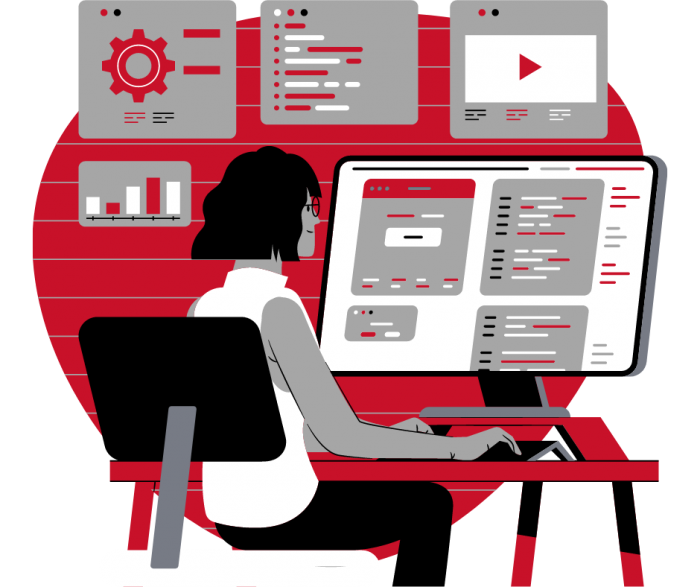Typical coders will cause you more problems than you think. Here is how you should do it?
It doesn’t matter if you’re working in an agile environment or pursuing a classic waterfall approach to your project – it’s always important to choose a partner, who’ll know how to support you. There are many Software Development Agencies out there and picking the right one can be quite a burdensome task. Software Development Agencies in general should focus on your goals regarding the product’s final form and boundaries like timeline or budget – amongst many other important factors. What they shouldn’t do, is burden you with technicalities and tasks being their side of the project – how many people do they need on the team or when – that is their problem.
So… why is it so important?
Currently, most Software Development Agencies are working in a transparent and easy-to-understand business model. You’ll find many sites offering great deals with prices ranging from 20-100 dollars, euros, or cryptocurrency depending on the skill set, programming language, expertise, etc. Seems simple, right? Just choose the best offer and go!
Well, it’s not that easy. While outsourcing, you need to be 100% certain that your partner is interested in seeing the project through. Take a closer look and determine if they’re interested in your goals, challenges and respect your boundaries not only before, but also after signing the contract. If you’ll happen to work with the wrong company it can be a slippery slope from here. They may start charging you money just as big HR companies and won’t care about final results. To make things worse, if something goes wrong or delays happen, they can start acting like it’s not their problem. Long story short- it’s always your fault. (Sounds eerie familiar, doesn’t it? 🙂
- The right partner for the right stage
First of all, a Software Development Agency must be aware of the stage your project is currently in

Why is it important? Naturally, companies are looking for a Software Development Agency that has experience in building similar projects to the one they want to build. We all know the reason – everyone wants to minimize the risk and foresee some of the challenges specific to the project. I’ve written an article recently about why expertise in choosing a software partner is so important. You can read it here.
However, the question we should ask more often is what was the role of the Software Development Agency in the project? Were they advising from the start or joined at some point as an augment? Maybe just joined to help provide a UX designer? So why is this so important? It’ll help to avoid a huge and costly disappointment. It’s important to define what kind of Software Development Agency will suit you and what outcome is expected, as well as knowing your needs and how to communicate them. Are you in need of an additional developer team? Or looking for support with technological aspects, like finding solutions using existing platforms and services? This will allow to cut costs and shorten the market launch time. (It is interesting how many companies are willing to suggest this, instead of building everything from scratch – definitely costing you more).
-
Software development is more than writing code and should be…
Developers are responsible for a lot more than just coding. Choosing the right people has more impact than you may know. Their performance will affect customer service, revenue flow, brand identity, content, and so on… Pretty much every aspect. A trusted company should go beyond what’s agreed upon and be willing to do everything to craft a good product – they’ll gladly contribute to the design, and assist in deployment.
Observe what kind of treatment you can expect from the Software Development Agency you approached. Are they willing to help with the process and see you succeed? Or are they just going to do what’s agreed and wave goodbye? The right company will support you till the end and will keep tabs on the results. That’s because they’re confident in their work, and probably they’ll try to establish a long-term partnership. (Which is not the case for many Software Development Agencies on the market). Those aren’t the only signs of a reputable company – should your product be a success, it’ll surely need updates, new version releases, etc. And who’s better for the job than the company you were developing the product with? Also, consider the SLA contracts.
One of the worst-case scenarios is when your software is in development and you don’t have a guaranteed response time from your partner.
A good company will also act as your CTO, should the situation require it. Some entrepreneurs seek that – many of them having little to no tech know-how. They’re looking for someone trustworthy – someone able to translate business language into tech and vice versa. It’s common practice for companies whose core business is not related to the product they need – they usually outsource it. And they’re willing to pay someone who’ll make the technical decisions, especially the right ones 🙂
Software agencies usually assign a tech lead who’ll act as a CTO for you. They’ll make decisions regarding the tech solutions, explain their consequences and make sure that you’ll feel included and understand everything. They’ll act as a leader for your team and take shared responsibility. With the rest of your crew, they’ll brainstorm, look for opportunities and limitations, as well as help with every aspect of developing the product. There’s a chance that a non-technical client suggests a scope too broad for the budget or requests a feature that isn’t possible to be introduced according to the spec. And that is where the Software Development Agency fits in – to deliver the tech perspective which will help to tackle it all.
Underestimating communication
Communication plays a huge role – not only in interviews but especially during cooperation. You must establish guidelines for the regularity of communication, channels you’ll use, and your expectations regarding contact. Honesty and being as clear as possible should be expected from both sides. Communication can make or break a business relationship, so it should NEVER be underestimated.
Ignoring the location
In today’s world working on a different continent is nothing unusual – technology allows instant communication and since we’re accustomed to working with people from all over the world, we can find that cultural differences may play a role in our work. Cultural differences can influence many elements that are important in the development process, like reporting, decision making, assigning tasks, and the very definition of completing a task. In different parts of the world, there are different work habits and management practices, so while interviewing, make sure that you discuss work organization and choose the best mutual approach when it comes to management. Additionally, make sure to maintain regular communication and that the most important things are established from the get-go.
Fixed price?
The majority of the software houses use T&M as the preferred business model, and we can understand why they do so. In this model risks are low, and they usually avoid responsibility regarding results. Check if your potential outsourcer is willing to consider a fixed price approach. There are risks involved, but it’s a good way to check if you have a flexible, capable and trustworthy partner.
Security…
Security is an interesting aspect. In my opinion, security is a topic that software houses tend to avoid. You’ll be assured, that the project is secure by design, that there are APIs and HTTPS protocols in use or that data storage is secure. However, if your company is a bit more experienced, you’ll surely provide the Software Development Agency with a list of security standards to meet – all that to ensure safety. (But… Does anybody check it after the delivery? It’s funny, right?).
After launch, there’s a possibility of a report from an OWASP scanner that’s done automatically – but does it really test the vulnerability of the written code? (I can assure you, not nearly enough) So what are these companies doing to secure your code?
There are various practices. Doe analysis, code review (a good one), guidance code writing, or perfumed pen tests amongst others. Also having similar in-house certificates, and making sure that the same standards are being met, can only be beneficial.
Contract
Somebody once told me that contracts are for bad times. There are stories about projects that failed for many reasons. Should your project fail, check what you’ve signed up for. Devil is hidden in the details. The contract should include a few important aspects. One thing is the number of corrections to report. This translates to how many times a client can add changes to the project, included in the overall price. Another thing is the guarantee the company offers after launch. Also, establish a clear exit procedure – it’s when you want to change the outsourcing provider during development. You should have access and be able to modify the source code. Leasing the code from developers you parted ways with, is the last thing you want to do. There’s also a security issue: while working together, you entrusted them with data that can be sensitive and contain intellectual property…
I hope that I’ve shown you some of the most important aspects regarding choosing a software partner – what to avoid, and what red flags you should look out for. If you want to know more and see how Yameo is addressing all the above points, while developing and providing competitive solutions – don’t hesitate to contact us!

